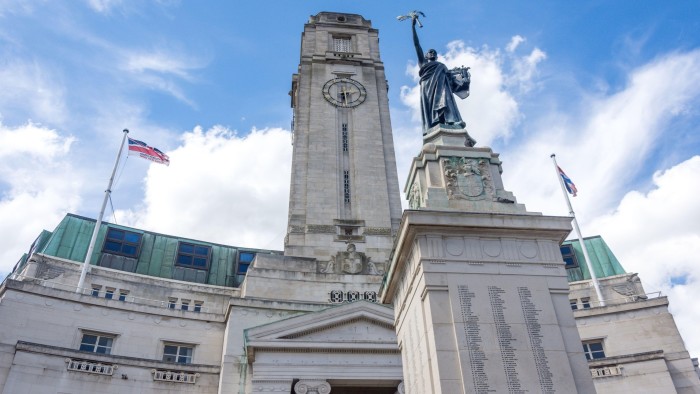Unlock the Editor’s Digest for free
Roula Khalaf, Editor of the FT, selects her favourite stories in this weekly newsletter.
England’s local authorities face a tripling in their audit fees this year, with some councils set to see their bills rise by as much as seven times.
The body that organises and sets fees for local council audits — the Public Sector Audit Appointments — has set an average increase of 230 per cent for 2023-24 compared with a year earlier, part of efforts to clear a multiyear backlog of local government audits.
Although the sums paid for audits of the 2022-23 accounts may still rise — which would make the comparative increase less steep — the PSAA’s set levels would see some councils face much steeper increases.
Woking Borough Council would see its bill rise seven-fold under the fee scale — from £42,121 to £306,112 — while Birmingham, Luton, Nottingham and Warrington all face a rise of between four and five times, according to Financial Times analysis of PSAA data.
The largest local council auditors are Big Four firms EY and KPMG as well as Grant Thornton and Forvis Mazars.
The spiralling costs are partly because of the rising complexity of council finances, which has been driven in part by local authorities chasing commercial opportunities to make up for cuts in central government funding.
Historic pressure to reduce audit fees paid by councils has also made the work unattractive, leading some auditors to pull out of local government work altogether and exacerbating the sector’s backlog.
Audits provide a check and warning system for the £127bn local authorities currently spend each year, but in the 2021-22 year only 12 per cent of local authority audits in England were finalised by the September deadline.
In November, the public spending watchdog said large holes in local government finances made it “impossible” to sign off central government’s accounts for 2022-23.
The government has attempted to address the logjam by setting backstop dates to force publication of accounts and reset the system. In December, 361 local authority accounts were published without being checked, though 77 audits for the years 2018 to 2022 still remained outstanding.
Woking’s particularly dramatic audit cost increase came after its new auditor, Grant Thornton, warned that “opportunistic” investments and ill-judged loans threatened the council’s financial viability. Along with Birmingham city council, the largest local authority in Europe, Woking has declared itself in effect bankrupt.
In 2023, fewer than 100 auditors were considered to have enough experience to sign off complex local authority accounts, and the PSAA struggled to find enough willing auditors to do the work.
The government has proposed an overhaul of the local audit system, including establishing a Local Audit Office to “streamline our fragmented system” and lead the required reforms.
Tony Crawley, chief executive of the PSAA, said the body was “acutely aware” of councils’ financial pressures and the “unwelcome additional budgetary pressure” of audit costs. “Work on reforming accounting and auditing frameworks must reduce the volume of local audit work needed to make it more proportionate,” he said.
A spokesperson for Grant Thornton UK said higher fees had “prevented the collapse of the local audit market” after other large firms exited their contracts, and were a necessary response to higher auditing standards and “increasingly complex” local audits.
A Warrington Borough Council spokesperson said: “The rise in local audit fees is a national issue, and in Warrington our fees are reflected for a council of our size and complexity.”
None of the other councils or auditors named responded to a request for comment.



